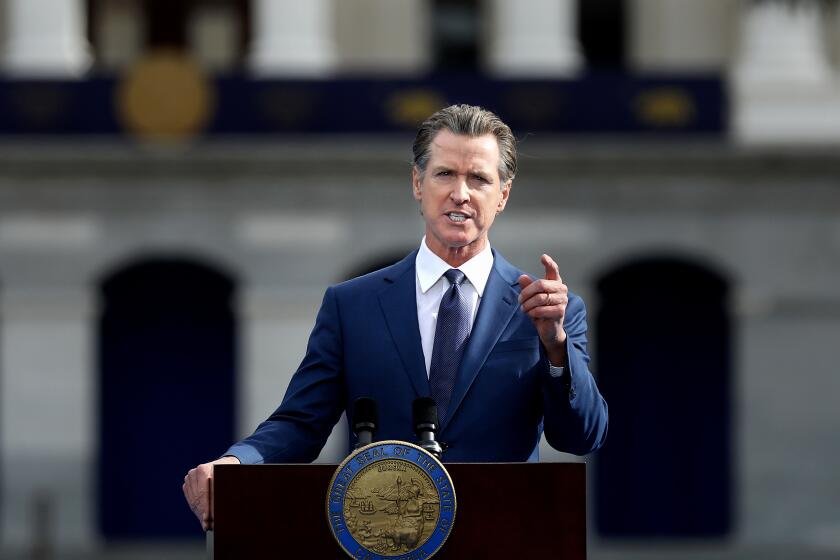Newsom wanted California to cut ties with Walgreens. Then federal law got in the way

- Share via
SACRAMENTO — Gov. Gavin Newsom declared last month that California was “done” doing business with Walgreens after the pharmacy chain said it would not distribute an abortion pill in 21 states where Republicans threatened legal action. Since then, Kaiser Health News has learned that the Democratic governor must compromise on his hard-line tweet.
California is legally bound to continue doing business with Walgreens through the state’s massive Medicaid program, health law experts said. And according to a public records request, the state paid Walgreens $1.5 billion last year.
Newsom’s administration confirmed it will “continue to comply” with federal law by paying Walgreens through Medi-Cal, which provides health coverage to roughly 15 million residents with low incomes and disabilities. Were California to stop covering Medi-Cal prescriptions filled at Walgreens stores, legal scholars warned, the state would run afoul of federal law, which allows patients to get their medications at any approved pharmacy.
“California has no intention of taking any action that would violate federal Medicaid requirements, or that could undermine access for low-income individuals,” Tony Cava, a spokesperson for the California Department of Health Care Services, said in a statement.
Newsom spokesperson Anthony York said, “Tweeting is not policy.” He added the governor will not “take any action that hurts people who need access to care.” Walgreens has even been reinvited to apply for a specialty drug contract that Newsom pulled back on renewing last month, York said. Walgreens has received about $54 million from the state under the contract.
The dust-up with the Illinois-based pharmacy chain illustrates Newsom’s panache for sweeping announcements on social media, where he garners national headlines but offers few specifics and little follow-through, political strategists said. Newsom has raised his national profile — and speculation of a presidential bid — by traveling to red states and launching a new political action committee.
“It’s much more about appearances and style and approach than it is about substance,” said David McCuan, political science department chair at Sonoma State. Newsom and his administration “oversell their pronouncements and don’t actually deliver.”
With $10 million in campaign funds, Gov. Gavin Newsom opened a new federal political action committee dubbed the “Campaign for Democracy” to boost Democrats in the 2024 election.
On March 6, the governor tweeted that “California won’t be doing business with @walgreens — or any company that cowers to the extremists and puts women’s lives at risk,” after the second-largest U.S. pharmacy chain said it would not dispense mifepristone in states where it is illegal to dispense the pill or where the company faced potential lawsuits if it did so.
Democratic strategist Steve Maviglio said continuing to pay Walgreens through Medi-Cal doesn’t take away from Newsom’s support of abortion rights.
“He’s going to get the headline for protecting abortion rights, and this he can chalk up to a technical difficulty,” Maviglio said. “He will be rewarded for standing up to a corporation.”
Federal law is designed to ensure Medicaid patients have choices in where they get healthcare, including prescriptions. Approved providers such as Walgreens are protected by Medicaid statute, which says that no health plan or entity can “restrict the choice of the qualified person from whom the individual may receive services.” Legal and Medicaid experts said that makes it extremely difficult for the Newsom administration to disqualify Walgreens.
“As long as Walgreens is performing for Medicaid beneficiaries as it should, dispensing all legal drugs in a manner that is consistent with permissible pharmacy practice, then I don’t see the basis for excluding them,” said Sara Rosenbaum, a professor of health law and policy at George Washington University.
The federal regulations that protect Walgreens are the same that have allowed Planned Parenthood to offer healthcare services to Medicaid enrollees in conservative states where leaders have sought unsuccessfully to exclude the network of clinics from receiving taxpayer funding.
An approved pharmacy company can be excluded from state networks only if it has committed fraud or other contract violations, said Edwin Park, a research professor at Georgetown University with expertise in Medicaid law.
“Certainly, that wouldn’t be the case for Walgreens,” Park said.
Chabria: California to transform infamous San Quentin prison with Scandinavian ideas, rehab focus
Gov. Gavin Newsom this week will announce plans to remake San Quentin, one of the state’s most storied prisons, using a Scandinavian prison model that emphasizes rehabilitation.
It’s unclear whether Newsom was aware of how difficult it would be for California to unwind its Medi-Cal provider agreement with Walgreens, said Daniel Schnur, a Republican-turned-independent strategist who also teaches political science at USC.
“The original announcement sounded like a seminal step for the state of California to take on principle, even at great financial expense,” Schnur said. “They’ve quietly backed away.”
Through a records request, Kaiser Health News learned the state paid Walgreens $1.5 billion last year to buy and dispense prescriptions to Medi-Cal enrollees. The bulk of the payment, $1.4 billion, reimbursed Walgreens for the prescriptions it distributed. And the remaining $123 million went to dispensing fees, a payment to pharmacists for each prescription they fill. The federal government covers at least half the state’s payments, which are also offset by rebates from drug manufacturers.
A Walgreens spokesperson declined to comment on its business with California, referring to the same statement it issued in March: “Providing legally approved medications to patients is what pharmacies do, and is rooted in our commitment to the communities in which we operate.”
Walgreens said it plans to dispense mifepristone “in any jurisdiction where it is legally permissible to do so.” The company was responding to a Food and Drug Administration rule finalized in January that allows certified pharmacies to dispense the abortion pill, which is the most common way people terminate pregnancies. Walgreens isn’t proposing to limit abortion pill sales in California or other states where abortion is legal and pharmacies are allowed to dispense it.
Democrats have urged pharmacy chains to sell the abortion pill even as GOP attorneys general threaten legal action. But many, including Walmart, Costco, Albertsons and Health Mart, have not waded into the fight. Only Rite Aid and CVS have said they plan to begin certification to dispense the pills.
Had Newsom been able to sever Medi-Cal’s relationship with Walgreens, he would have contradicted one of his signature health initiatives. When he took office in 2019, Newsom proposed the state take over prescription drug coverage for Medi-Cal patients, many of whom had been covered through managed-care plans.
Part of Newsom’s pitch: Patients could go to nearly any pharmacy in California.
This story was produced by Kaiser Health News, an editorially independent newsroom of the Kaiser Family Foundation that provides in-depth coverage of health issues.
More to Read
Sign up for Essential California
The most important California stories and recommendations in your inbox every morning.
You may occasionally receive promotional content from the Los Angeles Times.















